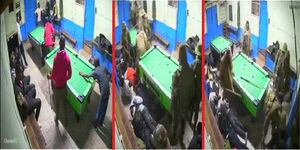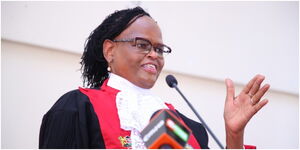The Law Society of Kenya President Allen Gichuhi has accused activist Okiyah Omtatah of taking lawyers' jobs due to his activity in court.
Speaking in Nyeri town after addressing more than 100 advocates drawn from Nyeri and Nanyuki, Gichuhi viewed the activist's filing of multiple public interest litigations as a threat to advocates adding that he (Omtatah) was doing their job and getting the credit for it.
“We are concerned that Mr Omtatah is getting a lot of leeway in the courts. He relies on information provided by disgruntled elements in a corporation or in government using confidential and privileged information.
“He is taking lawyers’ work because more Kenyans tend to trust him because he has become a name in himself," the society's president stated.
[caption caption="LSK President Allen Gichuhi with Senator Kipchumba Murkomen"] [/caption]
[/caption]
Echoing his sentiments, LSK Nyeri chairman Wahome Gikonyo posed; “Omtatah is more of an advocate. Why do I need to be a lawyer if anyone else can represent people in court and he is a layman?”
The lawyers decried that the activists were earning more than lawyers in the name of public interest litigation.
When contacted by Kenyans.co.ke, Omtatah dismissed the claims as an agenda being pushed by Jubilee machinery.
"The cases I handle are hardly a majority of the public interest cases out there. They are not even 0.01 percent," he told this writer on the phone.
He added that he worked with lawyers when cases were brought to him: "When I get such cases, and the client is able to pay, I refer them to lawyers."
Omtatah noted that a majority of the cases did not attract the interest of lawyers because they were not presented by Kenyans able to pay legal fees.
"Let them offer their services free if they are serious about handling these public interest cases," he challenged.
[caption caption="Activist Okiyah Omtatah"] [/caption]
[/caption]
On the complaint by the LSK President, Omtatah stated that it meant the society had noticed his work and that he delivered in court.
"I take it as a compliment rather than a condemnation," he stated.












